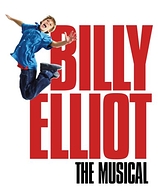
This is a wonderful, electrifying and emotional show, which fully deserves its many accolades and five-star ratings. As a separate interpretation of the 2000 film of the same name, I would highly recommend it as a stand-out story and an experience in its own right.
The casting of the leads is excellent, with the two lads playing Billy and Michael (played by Kaine Ward and Reece Barrett respectively on the evening I attended) being truly amazing. I have never seen children work so hard, and enjoy their work so much. The energy, raw talent and honed perfection of their acting, singing and dancing is astounding, and they received well-deserved standing ovations from the entire audience. Their camaraderie is also authentic, and the community-feel of the cast is successfully translated into the community-feel of the Yorkshire mining village, with the dynamic of the Elliot family being particularly genuine.
Unfortunately, I found the children’s ensemble cast very obnoxious. The acting is quite hammy, and I feel that the director could and should have done more to calm them down and get a less ‘stage school’ performance from them. In the ballet lesson scenes, rather than coming across as regular, slightly gawky kids who lack true talent (as is the case in the vast majority of children’s ballet schools), they simply come across as deliberately irritating. I also think it’s a shame that the majority of the laugh-out-loud humour rests on the little kids swearing. This is quite lazy of the script writers, and, again, could have easily been improved.
The staging is phenomenal, with the movable sets and their many different levels adding dimensions that draw the audience fully into the world created. It also, more practically, keeps the pace and tension of the show going as there is no need to pause the action for the scenes to be reset. This is all achieved by a truly excellent production crew, who seamlessly support the cast and enable the lightening-fast switches from scene to scene, and, therefore, emotion to emotion.
The choreography is also amazing. It is varied, precise, interesting and unusual, with even the most simple of moves, such as exiting the stage, having been extensively considered and reworked into something both peculiar but perfectly fitting. The performers themselves are well practiced, but had not become stale, and each glorious episode is enthralling.
The music and soundtrack of the show are very well suited to both story and setting, and work well with the choreography. However, the lyrics of the songs were another matter. I had the distinct impression that they had been included to officially categorise the show as a ‘musical’, as they seemed to have very little point, or add anything particular in terms of information, character development, or to heighten emotion. This feeling was not helped by the distinct lack of a ‘signature song’. The only real contender for this defining, powerful and resonant song would be ‘Electricity’, but, given that this features half way through the second act, I feel that it comes too late to be considered as the marker of the key, pivotal moment in the lead character’s journey.
In terms of plot, the stage show occasionally differs from the film of 2000, in that the Billy, although central, is not the only hub of action. There is greater focus on the socio-political background of the story, leading to a better balance between Billy’s personal journey and its context. In contrast, the film predominantly follows Billy and, in hindsight, gives quite a watered-down and saccharine sweet image of living in the middle of the 1980s mining strikes. The stage show has a grittier focus on the strike (with feelings towards Margaret Thatcher still running deep) and the associated violence and impact on family life, and this is evened out by the humour, tenderness and overall joyfulness of the individual characters.
The character of Nanna is more developed than in the film as well, serving to highlight Billy’s personal struggles, and to show that the community was not an easy place to live in even before the strike. There is also a greater focus on Billy’s deceased mother, his loss and attempts to cope, lending a hefty dose of pathos to the show which had many in the audience in tears. As a consequence, aspects of the film’s plot had to be cut to make allowances for these new features, and that comes predominately at the cost of Billy’s interactions with Debbie, his ballet-teacher’s daughter. She is very much a minor character in this show, but that does not harm the plot in any way.
There is a visually stunning juxtaposition between violence, dirt, complicated politics and human emotions of the strike, with the beauty, innocence and simplicity of the dance. By weaving the two, the audience can thoroughly understand how dancing becomes the escape, passion and lifeblood of Billy. With Billy’s background and context being more thoroughly explored, and by establishing the relief he feels when escaping from it in dance, the stage show can allow itself greater flights into fantasy without compromising the authenticity or seriousness of the story. Combined with the vividness of childhood imagination, the audience recovers from several surprises to thoroughly immerse themselves in the complete joy that both the characters of Michael and Billy, and, clearly, the actors themselves, are having during several of the more surreal moments.
This is a truly wonderful show and an excellent evening out. It seems to be a more resonant and impactful way of telling the same story than the film, and is richer for it. While the film was brilliant in its own way, it cannot compete with the atmosphere, energy and constant perfection of this live show, and the cast and crew bring the audience along the rollercoaster ride with them. Fantastic.
Go to https://billyelliotthemusical.com/london for tickets.

It is not a Yorkshire mining village – it’s County Durham!